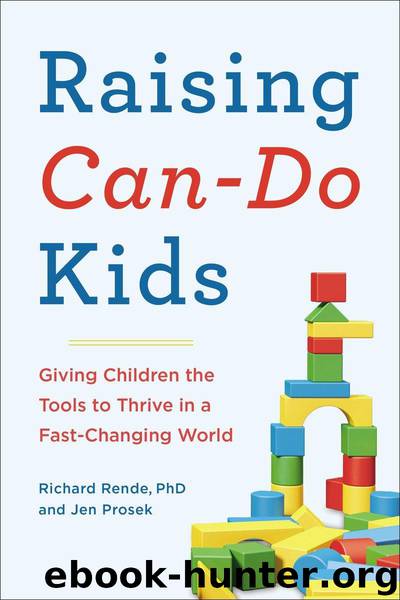0399168966 (N) by Richard Rende PhD

Author:Richard Rende PhD
Language: eng
Format: mobi
Publisher: Penguin Publishing Group
Published: 2015-07-07T21:00:00+00:00
Failure Isn’t an Option
Many parents are overprotective not because they want their children to succeed, but because they fear that they will fail. By contrast, many entrepreneurs believe that failure isn’t an option—not because they’re certain of their success, but because they don’t define “failure” in the way that most people do. The only failure, entrepreneurs believe, lies in not trying, not stretching, not treating those risk-taking moments as opportunities for learning. Remember, entrepreneurs take risks in a calculated way. There is always that chance that an endeavor won’t work out, but if it doesn’t, entrepreneurs know that they will always take away something of value, just by pushing into the unknown. Therefore, “failure” is experience and direction for future behavior. In that sense, “failure” isn’t an option because . . . it doesn’t really exist.
Jen has essentially erased the word “failure” from her vocabulary. At work, she makes sure her employees treat “failure” as a learning experience; she notes that her company would not survive if her employees saw failures otherwise. When setbacks do happen, she sends an empowering message that you can change what you are doing, especially if you dig deep to figure out why something isn’t working. She preaches it over and over: “What doesn’t kill you makes you stronger.” John Jacobs, cofounder and chief creative optimist of Life is good, likewise embraces mistakes for the learning they provide. “One of the biggest lessons we learned was that when you try, you either succeed or you learn. These are both positive things. We learned to try to keep trying, to stay nimble enough to try new things, to make mistakes, to fall down, and to learn from all of that ‘failure.’ That’s how you get smarter. If you fold your arms and tuck away and get defensive, it’s not a good recipe to grow and develop.”
Both Jen and John Jacobs also agree on a related principle: Every situation brings small successes, and kids need to learn how to recognize and embrace them. Sure, it’s great to celebrate the big victories in a kid’s life, but our children’s days are filled with so many opportunities to affirm little bits of progress that eventually add up to bigger successes. Help your kid connect the dots and chart how little moments lead to bigger payoffs. At dinner, encourage your child to talk about how he felt more comfortable dribbling a basketball in today’s practice than he did yesterday. Rather than reminding him that other kids are better dribblers and harping on this failing the second he leaves practice or a game, just reward this one little sign of progress. When he steals a pass during a game and dribbles full court for a game-winning layup, you can then make him aware of how many small successes led up to that big win.
This is especially important in relation to a child’s progress in school. As a parent, you can best support academic development by encouraging children to focus on each small success they achieve.
Download
This site does not store any files on its server. We only index and link to content provided by other sites. Please contact the content providers to delete copyright contents if any and email us, we'll remove relevant links or contents immediately.
The Lost Art of Listening by Michael P. Nichols(7506)
Rich Dad Poor Dad by Robert T. Kiyosaki(6633)
We Need to Talk by Celeste Headlee(5615)
I Love You But I Don't Trust You by Mira Kirshenbaum(3876)
The Complete Idiot's Guide to Coping With Difficult People by Arlene Uhl(3149)
Rich Dad Poor Dad: What The Rich Teach Their Kids About Money - That The Poor And Middle Class Do Not! by Robert T. Kiyosaki(2958)
A Burst of Light by Audre Lorde(2607)
The Book You Wish Your Parents Had Read (and Your Children Will Be Glad That You Did) by Philippa Perry(2528)
Dealing with People You Can't Stand by Dr. Rick Brinkman(2460)
Life Hacks by Dan Marshall(2456)
An Odyssey by Daniel Mendelsohn(2309)
The Expectant Father by Armin A. Brott & Jennifer Ash(2273)
Teach Your Child How to Think by Edward De Bono(2159)
No Time to Say Goodbye(2118)
What I Need by J. Daniels(2082)
The 7 Habits Of Highly Effective Teens by Covey Sean(2080)
The Out-of-Sync Child by Carol Stock Kranowitz(2055)
The Anxious Generation by Jonathan Haidt(2051)
I Don't Belong to You by Keke Palmer(2005)
